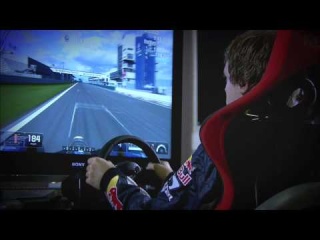X2010 to X2011 – the Evolution
The Gran Turismo 5 “Racing Car Pack” and the “Complete Pack” DLC, available from October 18th of this year also features the Red Bull X2011 Prototype.
All racing machines are subject to many small refinements and changes year after year. The X2010 is no exception, and through the hands of Red Bull Racing’s Adrian Newey and Gran Turismo, it has evolved into the X2011.
Here we will introduce the actual advancements that have been made:
1. Slimmed down mono-canopy for reduced frontal projected surface area
The engine induction box and the shock absorbent material supporting the driver helmet were optimised, to slim down the glass canopy characteristic to the X2010. As a result the frontal projected surface area of the car has been reduced.
2. Optimisation of the side pontoons
The shape of the side pontoons containing the radiator as seen from its sides, were changed to become a narrow– bulge– narrow cross section, so that the air flows neatly towards the rear (mainly to the rear diffuser).
As compared to the X2010, the upper and lower surface (seen from the side) of the side pontoon is now more teardrop in shape, and allows air to flow efficiently towards the rear. Though not apparent from the outside, the cross sectional area of the air duct leading from the exhaust fan to the skirt at the rear end was also made slightly larger to improve the efficiency of the fan.
3. Exhaust fan mechanism changed to a rotating blade - static blade combination
The fan used to draw out the air from the underfloor was improved. The X2010 utilised a simple fan using only rotating blades, but in the X2011 the fan now takes on a two layer structure using static blades added behind the rotating blades to improve efficiency.
Due to the improved efficiency it became possible to reduce the speed of the exhaust fan, resulting in reduced loss in drive power for the engine. This has improved engine output by approximately 5%.
4. Rear wing width increased to the full width of the body
The width of the rear wing on the X2010 was limited to be within the width of the rear wheels, but this has now been widened to the full width of the body. This allows it to more effectively rectify the air flowing over the rear wheel arch, reducing both drag and lift.
5. Optimisation of the rear bumper
Another characteristic shape of the X2010, the rear wheelarches, were changed to be more tear-drop in shape (mainly the upper surface). The lifted rear end of the arches were also made slightly longer.
This is to reduce the drag caused by the air wrapping around at the rear end of the car after passing though the rear wheelarch.
6. Extension of the rectifying fins at the rear end of the front wheelarches, towards the rear
The rectifying fins at the rear end of the front wheelarches were extended so that air flowing on the outside of the front wheelarches will flow more smoothly towards the side pontoons.
7. Changed the shape of the exhaust louvre on top of the pontoons
The shape of the exhaust louvres on top of the pontoons were revised to more efficiently draw out air in the side pontoons.
8. Exhaust outlet positioning
The position and direction of the exhaust outlet on top of the side pontoons were optimised to match the flow of air above the pontoons.
The Red Bull X2011 prototype has stepped even closer to perfection as the ultimate racing machine. Drive for yourself and experience the evolution.
-
Co-Streamers Wanted! All Hands on Deck for the World Finals in Fukuoka!
The 'World Finals', the finale of the 'Gran Turismo World Series' 2025, will be ...
-
Receive Two 'Series Champion Livery' Race Car Tickets With the 'Gran Turismo World Series' 2025 World Finals - Fukuoka 'Viewers Gift' Campaign!
The 'Gran Turismo World Series' 2025 World Finals will take place on Saturday, 2...
-
Receive up to 2,000,000 In-game Credits with the 'Gran Turismo World Series' 2025 World Finals – Fukuoka 'Predict the Champions' Campaign!
The 'Gran Turismo World Series' 2025 World Finals will take place on Saturday, 2...
-
The 'Gran Turismo World Series' 2025 World Finals - Fukuoka Special Page Now Open! Event Streamed Live From the Venue on 20-21 December!
The special page for the 'Gran Turismo World Series' 2025 World Finals - Fukuoka...
-
Real Racing Is Here! New Paid 'Power Pack' DLC Brings 50 New Races Across 20 Themed Categories!
On 4 December 2025, the highly anticipated 'Gran Turismo 7 - Power Pack' DLC arr...
-
Introducing the New 'Data Logger' Feature!
The Spec III update introduces the new 'Data Logger' feature. This tool creates ...













